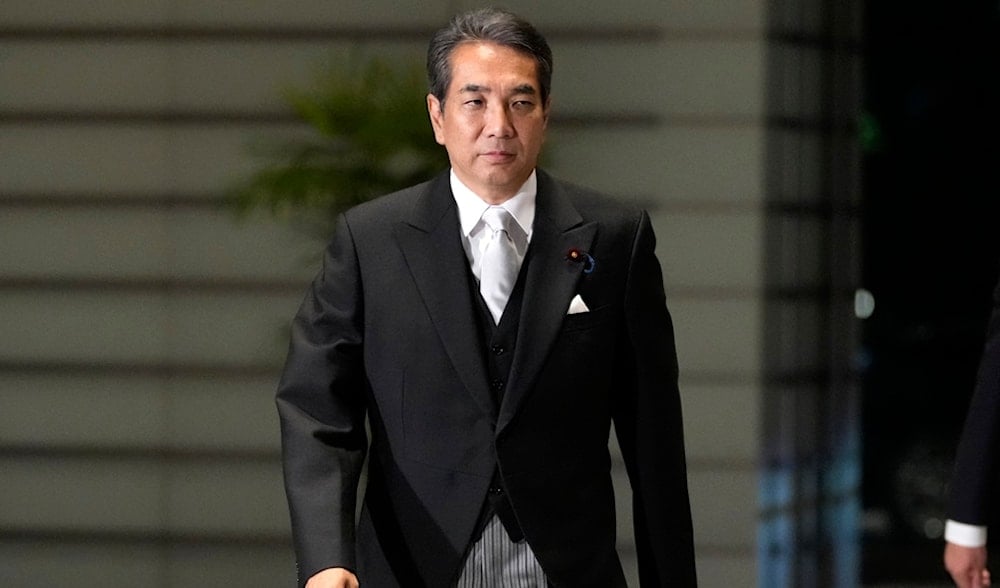Japan farm minister resigns over free rice remarks amid rising costs
Japan's Farm Minister, Taku Eto, resigns following controversial comments about receiving free rice, sparking public anger amid rising rice prices and food inflation.
-

Taku Eto, Minister of Agriculture, Forestry and Fisheries, arrives at the prime minister's office Monday, November 11, 2024, in Tokyo. (AP)
Japan’s Minister of Agriculture, Forestry and Fisheries, Taku Eto, submitted his resignation on Wednesday after facing intense public backlash over remarks about receiving rice for free, which were viewed as insensitive amid rising food costs across the country.
"Just now I submitted my resignation to Prime Minister Shigeru Ishiba," Eto told reporters at the premier’s office.
His resignation follows a speech delivered over the weekend, in which he stated that he had "never bought rice myself because my supporters donate so much to me that I can practically sell." The comments sparked widespread outrage in a nation where rice prices have nearly doubled year-on-year, according to data released in April.
The remarks were seen as tone-deaf when many Japanese households are struggling with food inflation. The spike in rice prices is attributed to a combination of factors, including poor harvests due to unusually hot weather in 2023 and panic-buying triggered by a "megaquake" warning last year.
The main opposition party was quick to denounce Eto’s comments, with Junya Ogawa, secretary-general of the Constitutional Democratic Party of Japan, calling them "extremely inappropriate, out of touch and intolerable."
Eto had previously expressed concern about the strain on consumers, acknowledging the hardship caused by inflation during recent public appearances. Japan’s government had even released part of its emergency rice stockpile to help ease the burden.
Minister apologizes, resigns
Facing mounting criticism, Eto attempted to clarify his remarks on Monday, saying he had exaggerated and incurred criticism at home.
“She told me that she does go buy rice when a stockpile of donated rice runs out,” Eto said of his wife, adding, “It's not like our family is living entirely off of rice gifted to us.”
Prime Minister Shigeru Ishiba issued a stern reprimand on Tuesday, using what Eto described as "very tough words," though initially indicating that Eto could remain in office. However, by Wednesday, the situation had escalated, prompting Eto to formally step down, which Ishiba accepted.
The resignation of Taku Eto underlines growing political sensitivity surrounding everyday economic issues in Japan, especially food inflation. It also highlights the expectation that public officials remain closely attuned to the challenges faced by citizens.
Japan: Massive US Treasury holdings a negotiation tool for trade talks
This also comes amid a Japanese financial crisis exacerbated by US President Donald Trump's tariffs. Recently, Japan had been considering leveraging its more than $1 trillion in US Treasury holdings in ongoing trade negotiations with Washington, Finance Minister Katsunobu Kato suggested earlier in May.
While Kato did not explicitly threaten a sell-off, he acknowledged for the first time that these holdings could serve as a strategic tool in discussions with the United States.
Speaking in a television interview, Kato emphasized that the primary purpose of Japan’s US Treasury holdings, the largest globally, is to maintain sufficient liquidity to enable yen interventions when necessary. However, he added, "we obviously need to put all cards on the table in negotiations. It could be among such cards."
"Whether we actually use that card, however, is a different question," he clarified.
Analysts view Japan’s suggestion as a subtle but significant move in strengthening its negotiating power amid ongoing Japan-US trade negotiations.

 3 Min Read
3 Min Read










